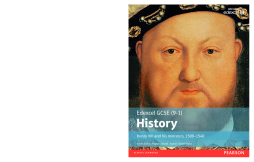
BOOK
Edexcel GCSE (9-1) History Henry VIII and his ministers, 1509Ð1540 Student Book
(2017)
Additional Information
Book Details
Abstract
Exam Board: Edexcel
Level: GCSE
Subject: History
First teaching: September 2016
First exams: Summer 2018
Series Editor: Angela Leonard
This Student Book:
- covers the essential content in the new specification in an engaging way, using detailed narrative, sources, timelines, key words, helpful activities and extension material
- uses the 'Thinking Historically' approach and activities to help develop conceptual understanding of areas such as evidence, interpretations, causation and change, through targeted activities
- has 'Writing Historically' features that focus on the writing skills most important to historical success. This literacy support uses the proven Grammar for Writing approach used in many English departments
- includes lots of exam guidance, with practice questions, sources, sample answers and tips to support preparation for GCSE assessments.
* These resources have not yet been endorsed. This information is correct as of 31st July 2015, but may be subject to change. You do not have to purchase any resources to deliver our qualification.
Table of Contents
| Section Title | Page | Action | Price |
|---|---|---|---|
| Cover | Cover | ||
| Contents | 3 | ||
| Timeline | 6 | ||
| Chapter 1: Henry VIII and Wolsey, 1509-29 | 8 | ||
| 1.1: Henry VIII, Renaissance Prince | 9 | ||
| England in 1509: society and government | 9 | ||
| The young Henry becomes king | 9 | ||
| Henry VIII’s character | 10 | ||
| Henry VIII’s aims as monarch | 13 | ||
| 1.2: The rise of Wolsey and his policies | 15 | ||
| Reasons for Wolsey’s rise to power | 15 | ||
| Wolsey’s reforms | 17 | ||
| The Amicable Grant, 1525 | 19 | ||
| The Eltham Ordinances | 20 | ||
| 1.3: Wolsey’s foreign policy | 21 | ||
| Henry’s European rivals | 21 | ||
| Wolsey’s successes and failures in foreign policy | 23 | ||
| 1.4: Wolsey, Catherine, the succession and annulment | 28 | ||
| Catherine of Aragon and the succession | 28 | ||
| Reasons for Wolsey’s fall | 32 | ||
| Recap page | 33 | ||
| Writing Historically | 34 | ||
| Chapter 2: Henry VIII and Cromwell, 1529-40 | 36 | ||
| 2.1: Cromwell’s rise to power, 1529-34 | 37 | ||
| Cromwell’s early life | 37 | ||
| Cromwell’s service to Wolsey | 37 | ||
| Serving Henry VIII | 39 | ||
| 2.2: Cromwell and the king’s marriages | 43 | ||
| Reasons for the fall of Anne Boleyn | 43 | ||
| Anne Boleyn’s arrest and execution | 46 | ||
| Jane Seymour: marriage, heir and death | 47 | ||
| The influence of the Seymours | 48 | ||
| 2.3: Cromwell and government, 1534-40 | 51 | ||
| Reforms of government and royal finance | 51 | ||
| 2.4: The fall of Cromwell | 56 | ||
| Reasons for Henry’s marriage to Anne of Cleves | 56 | ||
| The failure of the marriage and its implications | 58 | ||
| Cromwell’s fall from power | 59 | ||
| Recap page | 63 | ||
| Writing Historically | 64 | ||
| Chapter 3: The Reformation and its impact, 1529-40 | 66 | ||
| 3.1: The break with Rome | 67 | ||
| Henry as ‘Defender of the Faith’ | 67 | ||
| Reasons for Henry’s campaign against the pope and the Catholic Church, 1529-33 | 69 | ||
| The Act of Succession and the Act of Supremacy | 70 | ||
| 3.2: Opposition to, and impact of, the Reformation, 1534-40 | 73 | ||
| Elizabeth Barton, the Nun of Kent | 74 | ||
| John Fisher | 74 | ||
| The significance of opposition from Thomas More | 75 | ||
| The impact of the Reformation on the English Church | 76 | ||
| 3.3: The dissolution of the monasteries | 79 | ||
| The role of religious houses in local communities | 80 | ||
| Reasons for the dissolutions | 81 | ||
| The process of dissolution | 82 | ||
| The impact of the dissolutions: winners and losers | 83 | ||
| 3.4: The Pilgrimage of Grace, 1536 | 85 | ||
| Reasons for the uprising | 85 | ||
| Key events of the uprising | 86 | ||
| Reasons for the revolt's failure and its significance | 89 | ||
| Recap page | 91 | ||
| Writing Historically | 92 | ||
| Henry and his ministers, 1509-1540: Preparing for your exam | 95 | ||
| Answers | 101 | ||
| Index | 102 |
